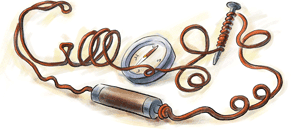Friday, October 16, 2009
Power Blogging
Improvements for all Time
- No bailouts. To anyone or any company at any time (except possibly in time of war to keep a crucial manufacturer in operation temporarily). It is an abuse of power and a violation of equal protection for the government to choose economic winners and losers. As in intervening on behalf of Bear Stearns but not Lehman Bros. In fact, the potential for catastrophic failures like those occurring in the real estate and credit markets would likely be lower if government did nothing to "ease the pain". Under our limited government approach Fannie Mae and Freddie Mac would never have existed as quasi-governmental groups, much less have had any implicit federal backing. Without those two creating artificial demand for subprime mortgages, the RE bubble would not have been as large as it was and the ripple effect not so damaging.
- Flat rate income tax. The vast majority of people would pay one, and only one, rate. Probably something between 10% and 20%. Those at the bottom of the income brackets, earning under maybe $25,000 per year would pay no income tax. Ideally, everyone would pay some tax, if we're to have an income tax at all, but this approach reduces the need for supplemental programs or credits for the poor that could be abused by both recipients and government officials. This scheme would eliminate all deductions, credits, and other tricks that politicians can use to grant favors to special interests and friends. Also, it ensures that nearly all citizens have an economic interest in voting and active civic participation.
- No czars. The word, or the position, is not found in the Constitution and there is no accountability of them to Congress or the voters. Therefore, the czars and their offices, staff, and budgets are gone. And let's not be slick by labeling them "special advisors" or any similar.
- The number of cabinet positions and their corresponding departments would be reduced, at least by half. Those that would remain include State, Justice, Defense, Treasury, and something that would address natural resources and infrastructure. Key agencies that would stay include FDA, CDC, Coast Guard (under Defense), and possibly FCC.
- Balanced budgets. Congress could not pass deficit budgets unless during times of declared war.
- No career politicians. Term limits are probably the only feasible route to accomplish this, although it is not without its own faults. In general, no person could hold elected office or appointed position for more than 8-12 years before having to return to private life for at least 2 or possibly 4 years. Also, Congress would meet only 5-6 months of the year in total. It was never expected or intended that legislators and top officials would be anything other than private citizens with real professions that paid their bills. Another solution beside term limits is to ban A/C from all federal buildings, with the exception of military posts. Congress would flee from Washington as soon as Spring arrived like rats from a sinking ship.
- Social Security funds (or other non-discretionary entitlements) could not be used for anything but Social Security. Ideally, we would admit that this is the largest Ponzi scheme in the history of world and radically reform it. Make it into something like a mandatory savings/retirement account. Social Security is very tricky, both financially and political, so I won't expound on it here.
We Own That Dome
I've never seen so many Don't Tread on Me or Come and Take It flags in one place before. And I've never felt so safe in Washington before either.
Message to Congress, the President, and the media: "Can you hear us now?!"
I encourage all of you to go right now to Meetup.com and search for your local Tea Party or 9/12 group. It's high time to restore respect for the Constitution, fiscal responsibility and restraint, transparency, accountability, and integrity to all levels and branches of our government.
Music to My Ears
 Russian Punk Rockers Rage Against the Putin Machine
Russian Punk Rockers Rage Against the Putin MachineRussia and Putin are usually not topics covered here on Yankee Scribble; I typically leave those Ballista. But since Ballista hasn't made an appearance in over a year, it seems I must take up the slack. Or, more to the point, the angst-filled youth of St. Petersburg have taking their musical jabs at the Soviet-styled strongman. Oh yes, the Ramones and Sex Pistols would be proud. I certainly am. If there is one group that is never afraid to speak out, it's the punk rockers. God bless them.
[T]he outspoken singer of Saint Petersburg-based punk rock band PTVP, saves much of his venom for Russian Prime Minister Vladimir Putin, referring to him as a "pig" in one of his most strident songs.As the article explains, this is nothing new for Russia, however, these voices have been fading.
[R]ussian rock music lost much of its rebellious spirit after being at the forefront of perestroika, the liberal reforms introduced by Soviet leader Mikhail Gorbachev in the 1980s, musicians and critics say.So how is Vladimir reacting to this scrutiny and criticism? As one would expect of a KGB colonel.Ironically, some of the leading figures in 1980s rock now perform at patriotic concerts organised by the Kremlin.
But in Saint Petersburg, a city long seen as Russia's "window to the West", a handful of bands have defied the trend and continue to speak out.
They include PTVP, whose full name translates as "The Last Tanks in Paris," and some veteran bands who complain of being marginalized on television and radio because of their politics.
"Most bands, for some reason, have become conformist and most music is just fun," said Sergey Chernov, a music columnist for the St. Petersburg Times newspaper who has followed Russian rock since the 1980s.
I sincerely hope PTVP keep it up, regardless of the quality of their music. If democracy is ever going to take deep root in Russia, then the artists, musicians, writers, and other creative folk need to lead the way. Imagine America without Thomas Nast, Bob Dylan, or Thomas Paine. Sadly, I have to ask, how long before these guys are found each with a bullet to the head? Or is that reserved for human rights lawyers? It's so hard to keep track of the many methods used by the Kremlin to eliminate its opponents.Several times over the years, police rushed the stage and stopped concerts after Nikonov sang about Putin, and once in Vyborg he was hauled off to jail before being freed without charges, band members recalled.
"It is mostly provincial towns that are afraid," Nikonov said.
Come to think of it, maybe Ballista has become a PTVP groupie. Either that or he's in the gulag. After all, Ballista's last post was on the Russian invasion of Georgia and I wouldn't put it past Ballista to go ballistic and join the Georgian cause.
The Inane Continues
Speaking of cold medicine, let's begin with more inane drug laws that are totally out of proportion to reality or common sense:
Wabash Valley woman didn’t realize second cold medicine purchase violated drug laws.Get ready for the next big reality tv hit: Grandmas Behind Bars!
When Sally Harpold bought cold medicine for her family back in March, she never dreamed that four months later she would end up in handcuffs.
Want more on how I feel about these laws and the jackasses that cause the problems prompting them? Read here.
Surprisingly, I actually enjoy Breaking Bad on A&E. Chalk it up to the same interest we all have for the mob and The Sopranos.
Friday, August 14, 2009
Google Celebrates the Pipe Bomb?
Thursday, August 6, 2009
Forty Years of Foam Fun

Nerf circa 1969 (Wikipedia)

Nerf circa 2009 (Hasbro)
If I had one of those belt-fed behemoths in my pillow fort nobody would ever capture my flag. That is, of course, until Nerf develops the N-Bomb, which will unleash massive amounts of atom-sized foam balls annihilating everything within a square mile.
By the way, did you know that Nerf is really an acronym? Watch the PC World video to find out what it is, if you don't already know.
Tuesday, August 4, 2009
Endeth the Empire?
Don Boudreaux - GMU Econ dept. chair...Uncle Sam is on the verge of paying the City of Los Angeles $30 million to subsidize a ten-year run of Cirque du Soleil.
So it's finally come to pass - America has embarked on the same road down which ancient Rome marched to its ruin: Uncle Sam not only subsidizes bread (by subsidizing wheat production) but now also circuses.
Alex at Marginal Revolution says this is enough to call it the "official" end of us all.
This time the barbarians aren't so much at the gate... they are inside... they are the apathetic, the uninformed, the lazy, the ones who think it's okay for their neighbors to pay for everything, not realizing that their own pockets are in turn being picked. Wake up people, and don't allow your principles, common sense, and personal dignity to be bought off by politicians.
However, as Rome shows the way to ruin, she always lights the way back to prosperity - The Republic.
Thursday, July 30, 2009
Concrete Answers
Incidently, did you know that Thomas Edison invented a new process for building with Porland Cement? Nor did I until my recent visit to Edison's home, Glenmont, in West Orange, NJ. It's a national historic park and well worth the trip, particular if you enjoy Victorian art and architecture. And - nerd alert - the Edison Company laboratory is set to re-open in the fall after a 7-year renovation. Seven years, huh? Wow, I sure hope my government healthcare system operates just as quickly as the Park Service!
Disclaimer: that "concrete answers" title came from the cement.org site, much as I'd like to take credit for another zippy pun.
Monday, July 20, 2009
A Giant Leap...

It is hard to believe. Forty years ago today man walked on a solitary orb of rock called the Moon. It's hard to believe that three men traversed the chilly vacuum of space to land on a celestial body. It's hard to believe that what was only a dream was achieved in less than 10 years of dedicated effort. In our current times of economic turmoil, when scions of industry and technological change like General Motors can barely produce cars people want and airlines are cutting services, that we as a nation, as a united people, as a human race could join minds to invent and build countless technologies and tools to safely carry people to and from the Moon.
I note this to both highlight how exceptional an achievement the Apollo 11 mission was and to send out a message of encouragement. We can accomplish great things, overcome insurmountable obstacles, and change the way we think about the universe if we devote our time and resources to it. And, if we push the doubters, naysayers, and red-tape dispensers out of the way. Innovation and progress do not result from overseers, lawyers, judges, administrators, or politicians but from risk-takers, hard workers, and all-around bright and dedicated people. While our national leaders can set an agenda, it is for us - the everyday people - to make dreams become reality to the betterment of all mankind. We went to the Moon because we chose to. Not even the sky is the limit to our success when we choose to.
Wednesday, July 15, 2009
Sons of Columbia
Ye sons of Columbia, who bravely have fought
For those rights which unstain'd from your sires you descended,
May you long taste the blessing your valor has brought,
And your sons reap the soil which your fathers defended.
'Mid the reign of mild peace,
May your nation increase,
With the Glory of Rome and the Wisdom of Greece;
And ne'er may the sons of Columbia be slaves,
While the earth bears a plant or the sea rolls its waves.
Let Fame to the world sound America's voice;
No intrigue can her sons from the government sever;
Her pride in her Adams-his laws are her choice,
And shall flourish till Liberty slumber forever!
Then unite heart and hand,
Like Leonidas' band,
And swear to the God of the ocean and land
that ne'er shall the sons of Columbia be slaves,
While the earth bears a plant or the sea rolls its waves.
~ Robert Treat Paine
Ne'er shall the sons of Columbia be slaves.
Update: This is only part of the poem, the first and last stanzas. The entire piece, along with a short bio of the author, can be found here.
Saturday, June 27, 2009
Automotive Milestone

 In case you can't tell, that's 250,000 miles on the odometer of my venerable 1992 Saab 900 hatchback. By sheer coincidence, this occurred just as I turned into a friend's driveway so I was fortunate enough to be able to snap these pics.
In case you can't tell, that's 250,000 miles on the odometer of my venerable 1992 Saab 900 hatchback. By sheer coincidence, this occurred just as I turned into a friend's driveway so I was fortunate enough to be able to snap these pics.What's even more impressive is the minimal amount of maintenance required to get to this milestone. The only power train-related repair was the recent replacement of the crankshaft timing sensor. I'm convinced that the engine on this Saab will outlast every other part of the car. I'm expecting that some day the body will just fall apart all at once, leaving only the motor sitting on the frame. I've taken to thinking of my Saab as though she's the Battlestar Galatica at the end of the Sci-Fi series: a proud, distinguished history; well deserving of retirement yet still called to service; and always a few trips away from busting wide open.
This is the type of quality that Saab was capable of producing before the buyout by GM. In fact, it is not too uncommon for Saabs from the 80s and early 90s to reach 300,000-500,000 miles. My hope is that we will see some wonderful engineering and design work under the stewardship of the new owners of my favorite Swedish brand. Koenigsegg certainly knows how to build things that go very fast, which might pair well with the "Born from jets" heritage of Saab.
Thursday, June 25, 2009
Funny Tees for Nerds


PCWorld.com has a bevy of tech-themed shirts posted today, including the two above that made me LOL. These are strictly for geeks, so get your taped-up glasses pointed over there now. Full slide show here.
Friday, May 8, 2009
Friday Fun

Now for the really cool part. The Monterey Bay Aquarium offers a plethora of webcams to view some of their exhibits, including one for... are you ready for this... OTTERS! Actually it's 3 webcams: 1 for sea otters, 2 for river otters.
Tune in to the sea otter cam at 10:30am, 1:30pm, and 3:30pm (all times Pacific) for feeding and training sessions - includes audio commentary by the staff.
By sheer coincidence, the above picture was one of the pics that Picassa served up on the daily Explore feature that grabs a variety of images from different users to share on the main page. The guy who took the picture, Edward Rooks, has many more amazing nature shots that you should check out. This particular picture highlights the surrogate program the aquarium conducts to nurture displaced otter pups before they are released back into the wild.
Wednesday, May 6, 2009
The Framework
First, any government should be effective. While it should be obvious that we as a people would want any organization formed for our benefit to be able to efficiently and functionally accomplish its chartered mission, recent history in particular has shown that this is not obvious (see any federal department/bureau/agency, excluding the military).
Second, any government must be simple. By this I mean easily accessible to the average person. Laws, statutes, and regulations should be written as plainly as possible so that every literate individual can be engaged with his or her government and understand what their representatives and agents are doing. A great example would be the federal tax code. Presently, the tax code is 80,000+ pages long. Armies of lawyers and accountants are currently employed to both write and decipher it, which inevitably leads to numerous different interpretations and loopholes. (Also leads to tax "oversights" by supposedly intelligent and informed people like House Ways and Means Chairman Charlie Rangel and Treasury Sec. Tim Geithner. Those would be the guys responsible for respectively writing and overseeing enforcement of the tax code. Ooops!) A simple tax code would be 1 or 2 pages, consisting of such "complex" language as "multiple your income by 0.15. That is your tax responsibility."
Third, good government must be transparent. Transparency dictates that everything the government does, aside from what is related to national security, is open to inspection by the public. It also requires a simple and effective (see above) process for accessing government records, publications, and proceedings. Again, transparency enables the average citizen to remain engaged and knowledgeable about what the government is doing. It can also work to keep politicians and bureaucrats honest (I know, oxymoron.) because everything they do is open to the light of day. Except for the Pentagon, every government office should be a metaphorical clear glass building.
Fourth, good government should be small and limited in powers and scope. This could be two criteria, but I'll treat them as one since they are so closely related. If you consider it for a moment, you will see that small and limited are absolutely necessary qualities if government is to be effective, simple, and transparent. Really, it's intuitive - the larger and more complex something becomes, the less efficient, simple, and easily understood that thing becomes. Does anyone who has every been on the phone with tech support think Windows is simple and effective?
Now, some would argue that you cannot have an effective government if it is simple and small. I reject these claims. Such arguments presume that the government knows better than individual citizens and should thus have a wider, deeper role in the affairs of the country. They also assume that the government can do many things better. Beyond several key functions, such as national defense and a justice system, this is laughable and demonstrably false. Think of your own life. Don't you achieve more and get more done when tasks are well defined and you have a simple method to do it? Of course you do! That applies to any organization, including government. The less they have to do, and better defined those tasks are, the more effectively, quickly, and inexpensively can they do it. And, the better you can judge success or misuse of power.
Hopefully, it is clear to you, dear reader, that these 4 characteristics of good government were all instituted at the time of the founding and ratification of the Constitution. These are not radical changes for our nation; quite the opposite. They all exist to one degree or another still. Rather they are a framework for evaluating how well our government is representing us and how healthy our republic is. Unfortunately, our national problems today can be traced to a steady creep away from effective, simple, transparent, and small and limited government. Especially at the federal level. We The People must demand from our government a steady return to strict adherence to these qualities.
Friday, May 1, 2009
A (Red) Banner Day

It is May Day, comrades! And what a glorious day for the proletariat is it. Those vile capitalist corporations General Motors and Chrysler are now securely in the hands of the State and the unions, just as it should have been all along. Dear Leader Obama has justly redistributed the means of production from the guilty financial pigs who took money from the masses and enriched the hapless heads of these vital national industries. If not for these brave moves by the State, the proud workers, whose labor is the root of all production, would have been left robbed of their entitled place in the factory.
Now, the unions, which tirelessly strive for the benefit of the common worker, will direct the activities of the auto giants. In addition, "our friends from Italy" at Fiat will ensure that the latest socially responsible policies from Europe are enacted, and that no trouble is caused by bourgeois provocateurs. Yes, Fiat, which has been slandered by agents of the West with the moniker "Fix It Again Tom" will help bring culturally progressive transportation to the people. Indeed, the compassionate State and its enlightened partners have "fixed it".
Additionally, the banks, which once sought only profit - the evil of all mankind - now follow the will of the State, ensuring efficient transfers of wealth to the unions. The auto makers never need worry about "money" again, leaving them free to maintain proper employment levels that will give a living wage to all workers, regardless of skill or seniority.
Soon, new cars will be rolling off the line. Cars that reflect the glory of the State in ushering forward a future of social equality. Of course, consistent with goals of the progressive society, cars will be distributed fairly, without callous regard for income or status. We can all be assured that the great and wondrous State and the unions will make excellent design selections. These will be cars that you will have no choice but to drive - literally.
Let us give thanks to our benevolent leader Obama and his deputies, and to the people's servants the unions. With our support they will surely extend their wise policies to every other industry. Already we see their efforts in the energy and health care sectors. Hope and Change are upon us! An illustrious May Day. Let us sing...
Wednesday, April 22, 2009
Would You Want This Guy as Your Boss?
The young exec was eventually appointed CEO and expectations from all quarters were high. The Board hoped that soon their stock price would rise and the company's image would improve as the energetic and eloquent CEO set out to promote the corporation. At a "town hall" meeting with employees, the new CEO stated his vision for the company but offered few details about what strategies would be implemented. He then told the workers that the company was making products that were of questionable quality and safety and that some employees were making too much money.
Next, at the CEO's first major appearance, at an industry conference, he used most of his speech to highlight what he considered the past mistakes of the company. He apologized for these and even indicated that his enterprise had too much market share. Then, rather than note some of the soon-to-launch products of the company, the CEO talked vaguely about products that had so far proven unpopular and unprofitable.
A while later, the CEO announced that the company would be acquiring several businesses in various industries completely unrelated to the corporation's core products. Moreover, these would be hostile takeovers, the existing managers at these firms would be fired, and the CEO and his deputies would take over strategic decision-making for them. This latest move was unnerving to investors because the CEO knew nothing about these new businesses.
Then, the CEO sent out a memo that some managers would be docked pay and denied promotions because the he simply didn't like the opinions they offered on a special task force under the old CEO.
At this point, if you were on the Board of this company, wouldn't you want to know what the hell the CEO was doing? Wouldn't you question what the CEO actually liked about the corporation and why he really wanted to be its leader? If you were an employee or manager, would you want this guy as your boss?
Mull this over and come back in a day or so for the rest of the story.
Wednesday, April 8, 2009
The Experts Agree
Tuesday, April 7, 2009
Fiction is Life
Although we eventually learn to distinguish between the world of make-believe and the real world, I suspect that many of us continue to experience fictional characters and events as being, in some way, real. This is because the imaginative act of following a story involves a suspension of disbelief, as we enter into the world it creates. When Anthony Minghella showed me a moving scene that he had just filmed for the pilot of "The No. 1 Ladies' Detective Agency," I found myself weeping copiously, right there on the set. I felt rather embarrassed -- it was only a story, after all -- but he put a hand on my shoulder and said that was exactly what he had done over that particular scene.A great story, whether fiction or not, touches us in personal ways that we might not fully understand or appreciate immediately.
Now, there was one element of the BSG finale that really tugged at me for some time after watching the episode ... the "life transition" of Kara "Starbuck" Thrace. As I watched Kara announce her time in this plane of existence had come to an end and then vanish I thought it a cinematographically beautiful shot and a fantastic decision by the director. But then my analytical brain kicked in. Wait, she's gone? Does that mean she really did die in the previous season? Is she an angel? I felt there was something unresolved about the character's plot line; moreover, I felt personally unfulfilled. As I spent perhaps a little too much time for a well-balanced person considering this, It slowly dawned on me that this was an appropriate end. It reflects the way people enter and exit our own lives, leaving us wanting more of them after they are gone, but happy for the time we had together. It provokes the question that we ask ourselves (and whatever god you believe in) what role that person plays/played in our own lives.
So, yes, I want more of Kara Thrace. Her exit deprives me of the opportunity to continue the storyline on my own, as Mr. Smith states we consumers of fiction are apt to do. (Of course, in science fiction, anything is possibly, and Starbuck could return - again - but if you are familiar with the BSG universe you know that would not fit with its style.) Yet, at the same time, Starbuck's absence redirects me to focus on the importance of real life family, friends, and acquaintences and what they mean to me. That's good fiction informing real life. As Starbuck's dear friend Lee says upon her sudden and unexpected vanishing, "You will not be forgotten." So it should be with all of us.
Entirely divergent, it seems to me that Ron Moore and the BSG writers are Ozzy Osbourne fans, based on the final scenes of Kara and her husband together in the CIC. Don't know what I'm talking about? Watch the series, starting at the beginning. It's well worth your time. In the meantime, listen to Ozzy.

Friday, March 27, 2009
Thursday, March 26, 2009
You Need to See This
This is why we need to return to our foundational principles, truly take responsibility for our own lives, and hold our elected representatives accountable. We simply cannot afford not to. More than anyone else, this is a problem for the youngest generations. Hey kids, you're right... your parents are out of touch with reality.
(Of course, so are you.)
Click here to find out how We The People are taking a stand for our future.

Sunday, March 22, 2009
Where to Start
At this point, let me digress for a moment. A common retort to the criticism leveled at Congress and the Obama Administration on their economic policies is basically, "Well, what's your plan then?" Good question. If the plan is not to spend trillions upon trillions of taxpayer dollars (borrowed without asking from future generations) on projects of questionable long-term value, then what should our national policy on the economy, or America in general, be? Another question being bandied about is, "How did we get into this mess?" Also legitimate to ask. In many ways the debate over what we do now as a country reminds me of all those movies about sports teams that start as the worst duds ever but end up as the champs. What always happens in these movies, whether it's the Mighty Ducks or Miracle or Major League? The coach and the team go back to the fundamentals of the game and practice those until they are too tired to stand and so bruised they look like a rotten piece of fruit. Only then does the team move ahead to the more complex and challenging plays. We love these types of stories for a variety of reasons, but in large part because they present the truth: in all things, you need to crawl before you can walk and you need to individually know your position before you can function effectively as a team.
In short, that is what I believe we as a nation need to do. Return to the fundamentals.
Now, back to my anger and the notion of fair/unfair. Essentially, we think of something as unfair if we perceive it to violate one or more of our principles or values. Principles and values are our fundamentals, just like being able to skate well or throw and catch a baseball are foundational in sports. So, I'm pissed because Congress, Obama, the Fed, almost all the way down to Smokey Bear have acted in ways that I think violate basic principles of American society and government. I cannot underscore this enough - I truly think that our Republic is in grave danger; that the America that is the beacon of hope and liberty for the world might just fade away. Therefore, rather than be angry and simply rant, I will propose solutions based upon the principles and values that built this country and that I believe we can (almost) all agree upon. Returning to our fundamentals means, first, knowing what they are, and so that is where I will begin. I think that once we have our principles and values out in clear view, the answers to our national problems and the mistakes that have led to them, as well as the courses of action we should not take, will all become much more evident. And, regarding the actions we should take, even preferable and easier to implement. You'll notice that the title of this post is not a question - it is a statment. We know where to start. Please join me again soon and we'll start together.
Friday, March 20, 2009
Where'd My Wallet Go?
House passes 90% tax on AIG bonuses. (Disregards unconstitutionality of the bill.)
Philly mayor proposes 36% property tax hike, new sales tax in $3.84 billion budget.
Illinois governor wants to raise income tax by 50%.
Budget deficit reaches $1.8 TRILLION.
And my favorite...
Federal government debt greater than the combined income of the the whole world!
After seeing all this I noticed my wallet lying on the floor by the back door. It was empty, except for a business card from my congressman, with the handwritten note, "Sorry I missed you, but thanks for your support." And this in tiny print, "Paid for with taxpayer dollars."
Tuesday, March 17, 2009
Robbin' Hoods
With this historical tidbit in mind, let me direct you to the latest snarlings of Congress and others in various levels of government. Some are "upset" about the fact that AIG, the insurance giant-turned ward of the feds, has paid $165 million in bonuses. Much of the money went to the financial unit behind the disastrous credit default swaps. While this might seem horribly unfair on the surface, the deeper truth is that AIG was contractually obligated to pay this money out, and did so with the full knowledge and at least tacit approval of the all the bigwigs overseeing TARP and the bailouts. That would mainly be Treasury Sec. Tim Geithner (who failed to pay income taxes for several years). So now the majority party in Congress, the loonies who has passed the bailout legislation, are hopping mad and want that money back. Listen to Sen. Schumer...
First, this is so disingenuous because Congress had the opportunity to limit how bailout money could be spend, but they didn't. In fact, Sen. Chris Dodd, head of the Banking Committee, specifically added an amendment that did away with limits on bonuses and compensation. Further, Congress and the Administration used AIG to, effectively, launder money. Federal tax dollars went to AIG, which was then directed to send that money to hedge funds, investment banks, and foreign financial groups who otherwise wouldn't have gotten TARP money.
Second, we can plainly see that those in power in Washington obviously believe that what the government giveth, the government can taketh away, and will do so by use of coercive force. Yeah, I really want these people in charge of my healthcare, business, energy sources, and everything else involved with my daily life. Today it's executives at AIG, tomorrow it could be "stimulus" dollars used for projects that Congress or Obama doesn't like. Maybe then they will decide that you didn't spend your own income properly or that your profession is making too much money. Now I direct you back to the story of Robin Hood and ask you to consider just whose money and wealth we're talking about here, and just who the greedy and morally-bankrupt players are. I think you'll see who the real 'hoods are and who's really being robbed.
Sunday, March 8, 2009
Them Bones
Of course, today hundreds of skeletons are exhibited around the world to the amazement and wonder of millions of children and adults. But imagine what a spectacle such an exhibit must have been to the people in 1868 (when the fossil was revealed). Sea monsters and dragons were still considered more fact than myth and science was largely the province of the wealthy and well-bred. Probably the only contemporary comparison would be if the skeleton of E.T. was put on display.
Visit the Academy's web site for more on Hadrosaurus foulkii and the current exhibit in commemoration of its discovery 150 years ago.
Saturday, February 7, 2009
Spending Our Way to Ruin
Let's be clear here. This is not "economic stimulus". It is government spending, pure and simple. Obama said so. (Sorry about the Canadian thing, but this was the best version I could find quickly.) What is the difference you ask. Well, stimulus implies that you get some sort of positive ripple effect through the economy or boost in total value (GDP). Supposedly, we will see more jobs, better incomes, and such. This spending will not achieve this goal because it is no different than the typical congressional appropriation. These bills just buy stuff for government - federal, state, and local. There is no real investment of the sort that individuals and businesses make to create added value. Think of it this way. The feds are going to pay a lot of people to build federal offices, install computers, pave roads, etc. So beyond the paychecks of these select, lucky people there will be no value added to the national economy. At the same time, a massive amount of money will be taken out of private hands, which means that when creative and innovative folks come along saying, "Hey, I have a great idea for a better mousetrap", there will be no money for them to do it. So the jobs that would have otherwise been created at the new mousetrap factory, jobs that would last more than the time it takes to install a faucet in a national park outhouse, will never materialize. Here's an even simplier analogy: Could you ever afford to buy the things you really want or repair your car or house, or save for retirement, if you were constantly giving your hard-earned money to your wacky neighbor who only used your cash to add more garden gnomes and floodlights to his yard?
The other important fact is that Congress has to borrow or print all this money, or both. None of those are good options for our nation. First borrowing. We all agree that the root of our economic problems is the reck-loose borrowing and spending of consumers and businesses. Now we are being asked, in a most insulting way, to believe that the way out of our debt is to take on more debt for things we don't really need. Second, printing cash. Inflation. INFLATION. INFLATION! Click here if you don't know why inflation is a bad, bad, bad thing for America.
 Speaking of debt... Think you are a fiscally responsible person, with a handle on credit card and consumer debt? Think debt isn't a problem in your life. Oh, aren't you a cute little deluded American. The recently-retired Comptroller of the Currency, the guy who is basically the head bookkeeper for the US, estimates that each American (not just taxpayer, each American) owes $184,000 on the national debt. And that figure keeps rising. Sooner or later, that bill will come due in the form of much higher taxes on everyone.
Speaking of debt... Think you are a fiscally responsible person, with a handle on credit card and consumer debt? Think debt isn't a problem in your life. Oh, aren't you a cute little deluded American. The recently-retired Comptroller of the Currency, the guy who is basically the head bookkeeper for the US, estimates that each American (not just taxpayer, each American) owes $184,000 on the national debt. And that figure keeps rising. Sooner or later, that bill will come due in the form of much higher taxes on everyone.Back to this spending spree package. What's in it? Good question. The bill from the House is almost 200 pages long and sheds little light on what we taxpayers are actually spending money on. However, here are a few choice porkers:
- $2.825 Billion for broadband internet for rural communities.
- $650 Million for coupons for analog-to-digital television converters
- $140 Million for "climate modeling" (I thought the science was settled on that one?)
- $7.7 Billion for the Federal Buildings Fund
- $150 Million for the Smithsonian
- $50 Million for the National Endowment of the Arts
All is not lost - yet. The Senate has not voted and the president hasn't signed anything into law. Take this opportunity to call, fax, email and generally pester your elected representatives into stopping this raid on our wallets and liberty. Because that's what this is all about - making everyone a recipient of government welfare. And that's just another way of saying losing your freedom. WE THE PEOPLE deserve much better. We deserve to be respected and listened to by our government. But only if we speak up. Go now and give them your opinion.
Tuesday, February 3, 2009
Get out your geiger counters
Yes, a company is going to market a "garden shed"-sized reactor. The technology was developed by the Los Alamos National Laboratory (think Manhattan Project) and the federal government has given their okay. The CEO of the firm leading this radioactive charge explains:
"Our goal is to generate electricity for 10 cents a watt anywhere in the world. They will cost approximately $25m each. For a community with 10,000 households, that is a very affordable $250 per home."So far it seems that the only orders are coming from utility providers and infrastructure builders. Call it the ultimate back-up (or primary) generator. But don't expect them to show up in Home Depot any time soon. I know, I was bummed out too. From a practical standpoint, however, this could be a boon to the developing world, where electricity can be scarce. And security is virtually a none-issue because the reactor design is ancient at 50+ years old (physics grad students use way more advanced stuff all the time), the reactors are buried in concrete underground, and there are no moving parts.
All you aspiring Dr. Evils our there, start saving your pennies because this baby would be the perfect complement to a villain lair.
On a somewhat related note, I picked up a new book entitled A Nuclear Family Vacation: Travels in the World of Atomic Weaponry by Nathan Hodge and Sharon Weinberger. Haven't started reading yet, but I'm giddy with anticipation.

Update: Great book. Highly recommended for anyone, particularly those interested in nuclear science, the military, history, or foreign affairs. Among the more memorable parts, and something that underscores a theme of the book, was when the current military officer in charge of our nuclear missiles couldn't remember the term M.A.D. How the world has changed in just a decade or so!
Scotland Runnin' on Whiskey. Literally.
Never mind the arguments over green power and climate change, I say this is the future. The more we imbibe, the more we can consume, so to speak. Seriously, though, this is innovation - doing more with what we have at hand, and what was before basically waste. I think I'll go open another bottle of Black Label to help make sure the project gets off to a good start.
Full article






